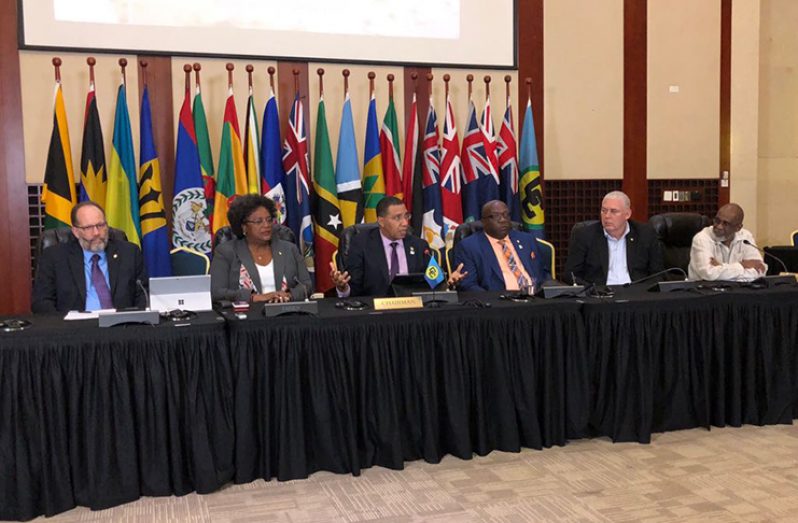— spouses and dependants of skilled can now travel freely in the Region
IN a historic move, a Protocol on Contingent Rights was signed by seven member states of the Caribbean Community (CARICOM) on Friday, paving the way for spouses and dependants of persons with approved skills certificates to move freely within the community and benefit from critical services in areas such as health and education.
The protocol was signed by chairman of CARICOM and Prime Minister of Jamaica, Andrew Holness; Prime Minister of St. Lucia, Allen Chastenet; Prime Minister of Grenada, Dr. Keith Mitchell; President of Suriname, Desire Bouterse; Prime Minister of Barbados, Mia Mottley; and Foreign Minister of Haiti, Antonio Rodriguez as the curtain came down on the 39th Regular Meeting of the Conference of Heads of Government of the Caribbean Community (CARICOM) at the Montego Bay Convention Centre in Jamaica.
In the closing press conference, subsequent to the signing of the protocol, Prime Minister Holness said the 39th Conference of the Heads of Government has made good on its promise to the people of the Region.
“We promised our people free movement, and this conference has recommitted to the free movement of skills, and has agreed that all states by December 31, 2018, would have put in place the necessary legislative framework to facilitate all 10 approved categories of skills. We promised that we would ensure family unification through the granting of important rights to spouses and the dependents [sic] of citizens that move across the Region to work, provide their services and establish companies,” the chairman of CARICOM said with a sense of accomplishment.
Under Article 46 of the Revised Treaty of Chaguaramas, the 15 CARICOM member states are expected to facilitate movement of 10 categories of skilled persons – artisans with CVQ, artistes, associate degree holders, domestic helpers/housekeepers with CVQ, media persons, musicians, nurses, sportspersons, teachers and university graduates.
HASSLE-FREE TRAVEL
With the commitments given by the heads of government, it is expected that by 2019 persons with approved skilled certificates should be allowed to travel freely within the community hassle-free, to work and live with their families.
Prime Minister Holness said the signing of the Protocol on Contingent Rights is critical in addressing the implementation deficits with the CARICOM Single Market and Economy (CSME).
Heads of Government also adopted the Procedures on the Refusal of Entry of Community nationals, thereby agreeing to have the procedures in effect by August 1, 2018. Additionally, they have been provided with a harmonised form to be used by immigration when refusing entry.
“These procedures, which all members must have in place no later than the August 1, 2018, will guide border officials on how they should treat nationals who are refused entry. This will safeguard the rights of all community nationals moving across the Region,” the chairman of CARICOM explained.
Cognisant of the need to keep focus on the CSME, the heads have agreed to hold a Special Meeting of the Conference on the matter in November 2018 in Trinidad and Tobago. They also agreed that the Prime Ministerial Sub-Committee on the CSME will meet on a quarterly basis to guide and invigorate the implementation process. The first such meeting will be in September 2018.
“We have also placed a great focus on advancing those areas which would help to create enabling support measures for a competitive single market. These include an investment policy, an investment code, an incentive regime, an integrated capital market, and securities legislation,” Prime Minister Holness added.
The heads of government have mandated the Council for Finance and Planning (COFAP) to finalise these instruments and have them completed by July, 2019.
On the matter, the Report of the Commission to Review Jamaica’s Relations within the CARICOM and CARIFORUM frameworks, the regional leaders during the three-day conference agreed that it would be taken into account in the work of the Prime Ministerial Sub-Committee on the CSME and at a Special Meeting of the Conference in November 2018.
NO QUICK FIX
The CARICOM Chairman made it clear that there is no quick fix to addressing the challenges of the Single Market and Economy regime, noting that the integration progress cannot be rushed beyond what member states would allow.
Prime Minister Mottley, who is the lead Head of Government on the CSME, said the Protocol on Contingent Rights had been on the agenda for approximately 10 years, and for it to be signed at the 39th Conference is a remarkable achievement.
“For this protocol to have been signed today is the most significant event in the history of Caribbean affairs since the single market signed here in Jamaica, and came into effect here in Jamaica in 2006. This is where it matters, this is where it makes a difference to the lives and decisions of people,” she told journalists.
The Barbados prime minister, in her quest to prove that the tide was changing, alluded to the fact that the Council for Finance and Planning (COFAP) met on Wednesday last after a period of five years.
Weighing in on the issue, St. Lucia’s prime minister said member states are better together, and there continue to be challenges in the implementation of aspects of the CSME; those challenges, and other extra-regional challenges and problems are better addressed as a collective.
“There is no example of any sector in which we are going to be stronger by ourselves, there are only great examples to show that we are going to be stronger by being united,” he posited.
The 39th Conference, which was attended by 15 heads of government and four of the five Associate Member States was considered to be a very successful summit.
Prime Minister of St. Kitts and Nevis, Dr. Timothy Harris and CARICOM Secretary-General, Ambassador Irwin LaRocque were also present at the press conference.





.jpg)








